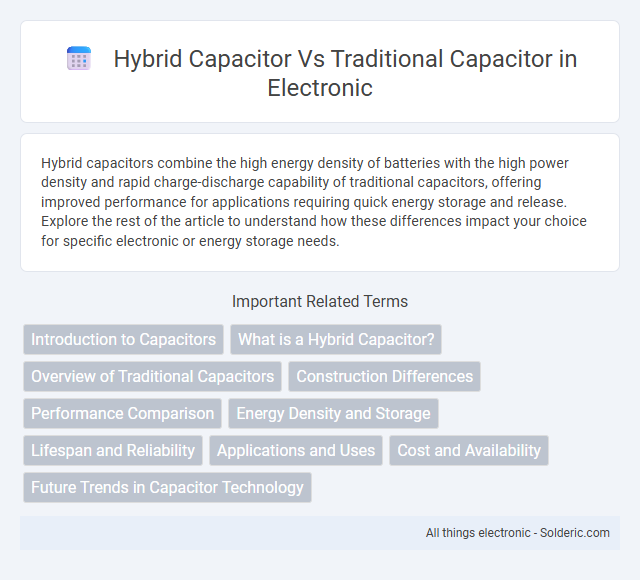Hybrid capacitors combine the high energy density of batteries with the high power density and rapid charge-discharge capability of traditional capacitors, offering improved performance for applications requiring quick energy storage and release. Explore the rest of the article to understand how these differences impact your choice for specific electronic or energy storage needs.
Comparison Table
| Feature | Hybrid Capacitor | Traditional Capacitor |
|---|---|---|
| Energy Density | Higher energy density due to combination of capacitor and battery-like properties | Lower energy density, primarily electrostatic storage |
| Power Density | High power density, suitable for rapid charging/discharging | Generally high power density, but less than hybrid capacitors in some cases |
| Lifespan | Longer cycle life, typically 100,000+ cycles | Shorter cycle life, typically around 1,000 to 100,000 cycles depending on type |
| Voltage Range | Moderate voltage range, usually lower than traditional capacitors | Wide voltage range, often higher voltage ratings |
| Application | Energy storage, electric vehicles, renewable energy systems | Filtering, coupling, timing circuits, energy storage in low-power devices |
| Cost | Higher cost due to advanced materials and technology | Lower cost, widely manufactured and standardized |
| Self-discharge Rate | Higher self-discharge compared to traditional capacitors | Lower self-discharge, better charge retention over time |
Introduction to Capacitors
Capacitors store electrical energy through an electric field created between two conductive plates separated by an insulating material called the dielectric. Traditional capacitors use materials like ceramic, electrolytic, or film dielectrics offering specific capacitance values, voltage ratings, and response times. Hybrid capacitors combine characteristics of both capacitors and batteries by using electrodes with high surface area and pseudo-capacitance, resulting in higher energy density and longer cycle life compared to traditional capacitors.
What is a Hybrid Capacitor?
A hybrid capacitor combines the advantages of both traditional capacitors and batteries, offering higher energy density than conventional capacitors while maintaining faster charge and discharge rates than batteries. It uses a combination of electrostatic and electrochemical storage mechanisms, enabling improved performance in applications requiring rapid energy delivery and longer cycle life. Your choice of a hybrid capacitor can enhance energy storage efficiency in devices where both power density and energy capacity are critical.
Overview of Traditional Capacitors
Traditional capacitors consist of two conductive plates separated by a dielectric material, typically ceramic, film, or electrolytic substances, enabling energy storage through electrostatic fields. These capacitors exhibit stable capacitance values and are widely used for filtering, coupling, and decoupling applications in electronic circuits. Energy density and voltage rating vary based on the dielectric type, but traditional capacitors generally have lower energy storage capacity compared to hybrid capacitors.
Construction Differences
Hybrid capacitors combine features of electrolytic capacitors and supercapacitors, utilizing an asymmetric construction with one electrode made of activated carbon and the other made of a metal oxide or battery-type material. Traditional capacitors, such as ceramic or film types, have symmetric electrodes usually made of metal plates separated by a dielectric material. The construction of hybrid capacitors enables higher energy density and longer cycle life compared to traditional capacitors, which focus primarily on stable capacitance and rapid charge-discharge cycles.
Performance Comparison
Hybrid capacitors exhibit higher energy density and longer cycle life compared to traditional capacitors, making them suitable for applications requiring rapid charge-discharge cycles and enhanced durability. Their combination of electrochemical and electrostatic storage mechanisms results in improved capacitance and better voltage stability under load. Traditional capacitors, while offering superior power density and lower equivalent series resistance (ESR), typically lack the capacity retention and longevity found in hybrid capacitor technologies.
Energy Density and Storage
Hybrid capacitors offer significantly higher energy density compared to traditional capacitors by combining the fast charge-discharge capabilities of capacitors with the energy storage efficiency of batteries. Your energy storage needs benefit from hybrid capacitors' enhanced capacity, providing longer-lasting power in compact designs. This improved storage performance makes hybrid capacitors ideal for applications requiring both quick bursts of energy and sustained power delivery.
Lifespan and Reliability
Hybrid capacitors offer a significantly longer lifespan and enhanced reliability compared to traditional capacitors due to their unique combination of electrostatic and electrochemical energy storage mechanisms. Their robust construction allows them to withstand higher charge-discharge cycles, reducing degradation and maintaining performance over extended periods. When selecting components for your application, choosing hybrid capacitors ensures superior durability and stable operation under demanding conditions.
Applications and Uses
Hybrid capacitors combine the high energy density of batteries with the fast charge-discharge capability of traditional capacitors, making them ideal for applications requiring quick energy storage and delivery, such as power backup systems, renewable energy integration, and electric vehicles. Traditional capacitors are widely used in electronic circuits for filtering, signal processing, and energy smoothing due to their rapid response and high power density. Your choice between hybrid and traditional capacitors depends on the specific application needs, balancing energy storage capacity and power delivery speed.
Cost and Availability
Hybrid capacitors generally offer a cost advantage over traditional capacitors due to their use of advanced electrode materials that balance energy density and power performance. Their increasing commercial availability stems from advancements in manufacturing processes and growing demand in energy storage applications. Traditional capacitors remain widely accessible and cost-effective for basic applications, but hybrid capacitors provide more competitive pricing for high-performance energy storage solutions.
Future Trends in Capacitor Technology
Hybrid capacitors combine the high energy density of batteries with the rapid charge-discharge capability of traditional capacitors, making them pivotal in next-generation energy storage solutions. Advancements in nanomaterials and electrode design are driving the evolution of hybrid capacitors, promising greater efficiency and longer lifespans than conventional capacitors. Your choice of capacitor technology can benefit from these innovations, particularly in applications requiring high power density and endurance.
hybrid capacitor vs traditional capacitor Infographic

 solderic.com
solderic.com